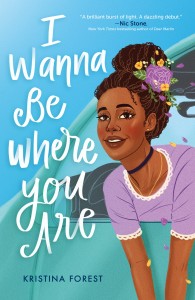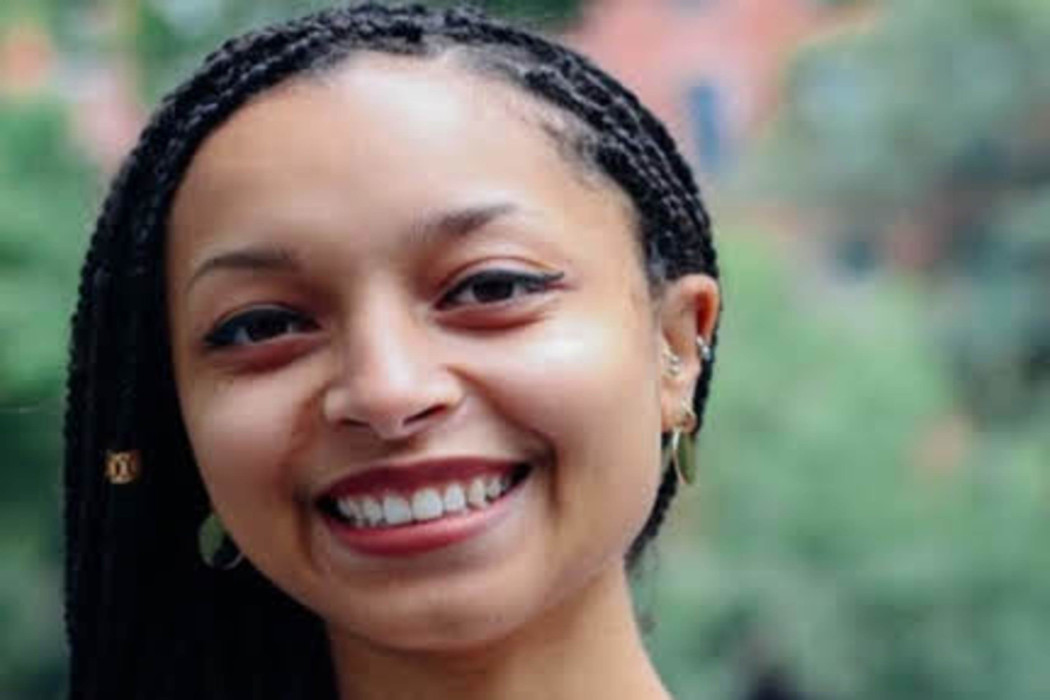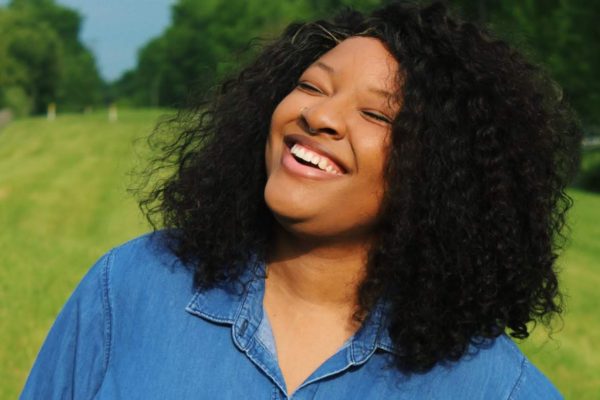Chloe Pierce is a horrible daughter. At least, in her mind she is. But of course, what seventeen-year-old who’s used to following their mom’s rules, has been trained in the disciplined art of ballet for years, and is now suddenly on a secret mission to audition for a New York Conservatory that their mom forbade them from doing in the first place wouldn’t immediately think that of themselves when the guilt is eating them up inside?
 Kristina Forest’s debut novel, I Wanna Be Where You Are picks up right there. The coming-of-age rom-com finds Chloe unwillingly teaming up with her next-door-neighbor/former childhood best friend Eli and his dog Geezer so Chloe can make her audition and Eli can make it to his dad’s house for spring break. Of course, during the road trip, things don’t go as planned but, they do make for a fun and heartfelt adventure full of growth and reflection.
Kristina Forest’s debut novel, I Wanna Be Where You Are picks up right there. The coming-of-age rom-com finds Chloe unwillingly teaming up with her next-door-neighbor/former childhood best friend Eli and his dog Geezer so Chloe can make her audition and Eli can make it to his dad’s house for spring break. Of course, during the road trip, things don’t go as planned but, they do make for a fun and heartfelt adventure full of growth and reflection.
“Chloe received my tendency to be skeptical and cautious, and we’re both ambitious. Eli is pretty funny, and I’d like to think that I have a good sense of humor. But he can also be quite guarded with his true feelings, and I think I can be the same way, depending on the situation,” Kristina says about what parts of herself are in the characters.
Creating this type of coming-of-age story for Chloe and Eli came from a necessity for Kristina to center Black youth in stories. As she puts it, “Ultimately, I wanted to tell a story about two Black teens with big dreams, where things may feel like life or death, but at the end of the day, they will be okay. Chloe and Eli are really just trying their best to find happiness on their own terms.”
Chloe and Eli are really just trying their best to find happiness on their own terms.
Without giving too much away or filling in the details, the two as a dynamic fall into the friends to ex-friends (arguably enemies) to friends to lovers trope. A known (and enjoyable, but maybe I’m biased as an on-the-record fan) trope in romcoms which also made the story pleasurable to write. “The easiest (and most fun) scenes to write were the scenes where they were arguing. Chloe is so easily flustered and Eli has so many fast quips and jokes that get under her skin. If I had to pick one, I’d say their initial interaction in chapter 2 when Eli first discovers that Chloe plans to sneak out on a road trip,” says Kristina when I ask about the easiest moments to write.
For the hardest one, however, she withholds details because it’s a spoiler, but she does tease what the scene entails. “…It is a scene where they have a tough conversation, and both characters come to terms with the role they played in their falling out,” she hints.
Asking her about the logistics of writing a road trip story, Kristina notes the importance of thinking about timing–something she hadn’t anticipated prior to crafting the story. Chloe and Eli’s road trip goes from New Jersey to North Carolina. Figuring out timing for Kristina meant looking into, for example, the length of time to get from the DC area of Virginia to a North Carolina beach.
It also meant looking into how many conversations/scenes could fit into those time frames. “I actually took Chloe and Eli’s road trip myself, and once I did that, the logistics of the trip came together a lot more easily,” she shares.
In classic road trip story fashion, Chloe and Eli make a few stops some out of necessity and some because, well, why wouldn’t you want to sightsee you could? Looking back at the stops the characters took, Kristina says that she loves each of the stops for different reasons while also highlighting Chloe and Eli’s Virginia visit to spend time with Eli’s older sister Larissa at college.
The stop is a meaningful moment for them both. As a character, Larissa shows both Chloe and Eli what’s possible outside of living in parental expectations. For Chloe, that means believing in herself and her ability as a dancer as opposed to just living in the shadows of herself before the incident that led to her being self-conscious of her dancing skill and of her falling out with Eli. It also means her fully embracing being out of the shadow of Larissa when they used to dance together.
“For a long time, this book didn’t have a title, and later, it was temporarily called The Pointe of Everything. My editor and I went back and forth for almost a month trying to decide between titles. Eventually, an author friend suggested looking up song lyrics for ideas and while looking up lyrics, I started paying attention to the song titles instead. After writing down a few options, I decided that I Wanna Be Where You Are was the only title I really loved,” Kristina talks about the title of the book–named after The Jackson 5 song which makes an appearance after Larissa gets Chloe a practice space in her campuses dance studio.
“I felt it spoke to Chloe’s desire to want to be wherever Avery Johnson was, and eventually wherever Eli is,” she further explains how the song describes Chloe’s motivation. “The word ‘where’ indicates place, and I felt like that was appropriate for a road trip book. I sent it to my editor and agent and they loved it too. I found a way to add the song into the draft after the new title became official.”
Aside from Chloe’s relationships with Eli and Larissa, Chloe’s other impacting dynamics are with her wonderfully dramatic and loyal best friend Reina and with Trey the childhood best friend of Chloe and Eli who moved away. But the most significant for Chloe might actually be with her mom given how much they’ve trusted and leaned on each other and how Chloe’s determination to audition affects that.
“Writing the relationship between Chloe and her mom was actually a little challenging. My mom and I are very close and we don’t argue often, and she also has been pretty supportive of all of my dreams and ambitions, so our relationship is quite different from the relationship that Chloe has with her mother,” Kristina talks about developing their relationship. “There’s one scene in particular where the two of them get into a pretty heated argument and I had a hard time figuring out how to move the conversation forward because it was something I’d never personally experienced.”
“While drafting this story I found myself calling my mom a lot and asking for her perspective. Like how would she feel if I lied to her about something as life-changing as Chloe going on an audition? If I came home after a week of road tripping behind her back, what would she say? Those conversations really helped with developing Chloe and her mother’s relationship,” she continues.
The relationship between Chloe and her mom makes where both of them are coming from feel understandable: her mom wants to protect her daughter and keep her safe especially since Chloe has been hurt before and the two of them have always been close. It’s also understandable that after all the years of her proving herself trustworthy towards her mom while constantly doubting her abilities, Chloe would be itching to prove her dependence and also prove to herself that she’s stronger than she gives herself credit for.
“What I mostly wanted to show is that parents don’t always know best, just as their children don’t always know best. It’s important for teens and parents, and vice versa, to try to see each other as people who are flawed and vulnerable,” Kristina says about the takeaway she hopes comes across. “We all make mistakes, and I always think it’s important to reach compromise and some level of understanding.”
It’s important for teens and parents, and vice versa, to try to see each other as people who are flawed and vulnerable.
There’s a running theme throughout the book about wanting everything to go back to the way it was. It’s a fairly common thing (not just in adolescence) for people to experience especially when they’re experiencing changes, when time is moving faster than they’re ready for, or when there are unsolved regrets/mistakes.
Still, it’s important to have the willingness to take those risks and experience new things. In regards to Chloe and Eli, Kristina shares that even though the two of them focus a lot on what they would have done differently in the past and how much simpler it was, they’d be pretty unhappy had they never taken the journey they go through in the book.
“Chloe would probably be going through the motions of high school and dance class, all the while wishing she would have taken the chance to audition. And Eli would probably just get deeper and deeper into his feelings until he finally exploded,” she says. “I also don’t think either of them would have taken the steps to repair their friendship. Being on the trip and spending so much time together is what helped heal not only themselves as individuals, but their relationship as well,” Kristina credits the road trip as well as both the individual and joint journey the road trip requires Chloe and Eli to go on.
“Chloe is determined to chase her dreams because she loves ballet, and it means everything to her. She literally can’t picture a future without it. That is her main motivation,” Kristina says about Chloe’s determination when I ask her if Chloe holds onto her love of ballet so much because Black ballerinas can often experience “othering” due to the craft being looked at as a predominantly white art.
Even though it’s made known in the book that Chloe is aware of this, Kristina explains that isn’t necessarily the thing driving her motivation. However, it is why Avery Johnson means so much to her, “She wants very badly to dance with Avery Johnson because he is a Black man who started his own ballet company/academy, and she realizes how major that is. She’s not just fighting to dance for any company, she wants to dance with Avery Johnson, specifically, because she believes that he values Black dancers.”
 Like Chloe, Kristina grew up on dance, falling in love with ballet when she was young. “I’ve just always thought it was very beautiful, and a ballerina was what I wanted to be,” she explains when I ask about if there was a key moment she remembered falling in love with ballet. “I also really loved movies like Center Stage and Save the Last Dance, and they definitely gave me the motivation to convince my parents to sign me up for ballet classes.”
Like Chloe, Kristina grew up on dance, falling in love with ballet when she was young. “I’ve just always thought it was very beautiful, and a ballerina was what I wanted to be,” she explains when I ask about if there was a key moment she remembered falling in love with ballet. “I also really loved movies like Center Stage and Save the Last Dance, and they definitely gave me the motivation to convince my parents to sign me up for ballet classes.”
Similar to dance, Kristina admits she doesn’t know the exact moment that she fell in love with writing, but knew she always loved it. “Picture prompts were my favorite school assignments, and I would always go above and beyond whatever was required,” she reminisces.
“I don’t know if ballet has had a direct effect on my storytelling, but I do think that it has affected my writing. As a former dancer, I’m always conscious of rhythm, and I pay a lot of attention to the rhythm of my sentences while writing,” she connects the two. She also mentions in her authors note that she took some dance classes while preparing to write this story so she could really capture the feeling of dancing (and also of messing up and getting better.)
Writing a book where dance is embedded into the purpose of the story not only allowed Kristina to combine these two art forms that mean so much to her but also gave her the opportunity to revisit dance. “Drafting this story made me remember the beautiful language of ballet. Most ballet terms are French, and I loved peppering them in throughout the story,” she says.
There are a lot of books that explore Black pain, and those narratives are valid and should be told, but it’s also important for young Black readers to have happy, swoony, and fun stories as well.
Having always been a lover of storytelling, Kristina grew up loving Sarah Dessen as a teen. “While her characters didn’t look like me, I related to their experiences with first love and heartbreak, navigating friendships and familial relationships,” Kristina reflects. “If I had to pick two of her books that resonated with me the most, I would say This Lullaby and The Truth About Forever.
Still, even though those books meant a lot to her and she could see her experiences in them, she–like most Black youth growing up reading young adult books–didn’t see herself and her experience while holding Blackness in them. “I just think it’s really important for young Black girls to read happy stories with characters who look like them,” she starts when I mention how a previous tweet of hers about giving Black girls happily ever afters stood out to me.
“There are a lot of books that explore Black pain, and those narratives are valid and should be told, but it’s also important for young Black readers to have happy, swoony, and fun stories as well,” she continues. I Wanna Be Where You Are carries that kind of relatability and realism that we expect and look for in a coming-of-age story. But in the rare chance that it’s a Black teen coming of age story, it centers on the guy with the Black girl serving as a love interest but often not as fully fledged out as she could be. I Wanna Be Where You Are also carries the romanticization and idealism that we also expect and look for in a coming of age story. But in the more common chance that it’s a teen girl coming of age story, white girls are usually the protagonists experiencing it.
It’s a discussion that many, but especially, Black young adult writers have brought to light recently. That said, the Black (and Brown, but in this case Black) narratives that are more likely to be greenlit is something that Black and Brown people who love consuming media that range from books to TV to movies have always had to notice and internalize.
Having an interest in writing children’s/young adult literature, authors like Kristina get the opportunity to create stories that help normalize Black youth as protagonists and as people deserving and worthy of joy and adolescence. “I try to always remember that I’m writing for teens, and teens don’t care about who has the most pre-publication buzz, or ‘Best Of’ lists, or trade reviews. They care about reading a good story that resonates with them. A story in which they can see themselves or their experiences reflected,” Kristina says about what she’s gained and realized writing in this genre.
“Earlier this year I found myself stressing over the above-mentioned things, and then I received messages from a few teen bloggers who read my book and connected so much with Chloe and Eli, and it was an amazing reminder for why it is that I do what I do,” she continues. Kristina concludes defining this realization as motivation, “Keeping the audience at the forefront of my thoughts while writing is really important, and it has definitely been the most fulfilling part of this journey.”
~~~
Bonus Questions
Teenplicity: Music plays such a prominent role in this book, how much does music play a role in your writing process?
Kristina Forest: For the most part, I actually can’t listen to music while writing because I get too distracted. The only time I can listen to music is if I’m writing a romantic scene and I need a song playing in the background to help set the mood. I create playlists for my characters, and I listen to them on the subway or while taking walks so that I can be thinking about the story even when I’m not writing.
T: What are some myths about writing you had to unlearn?
KF: Two things come to mind: One, that it’s bad to use adjectives when writing dialogue. For example: “Don’t do that!” she said testily.” Two, don’t use exclamation points in dialogue. I don’t think either of those is true, especially since they help with voice.
~~~
You can stay up to date on all things Kristina Forest by following her Website, Twitter, and Instagram accounts.
I Wanna Be Where You Are is available to buy in stores and online now.
Check Kristina’s website to see what stops she’s making on tour.




